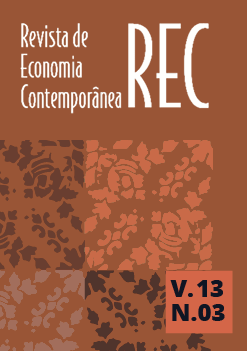ANÁLISE EMPÍRICA DA FORMAÇÃO DE EXPECTATIVAS DE INFLAÇÃO NO BRASIL: UMA APLICAÇÃO DE REDES NEURAIS ARTIFICIAIS A DADOS EM PAINEL // EMPIRICAL ANALYSIS OF THE FORMATION OF INFLATIONARY EXPECTATIONS IN BRAZIL: AN APPLICATION OF ARTIFICIAL NEURAL NETWORKS TO PANEL DATA
Palavras-chave:
expectativas inflacionárias, metas de inflação, redes neurais artificiais, bootstrap, dados em painel //Resumo
RESUMO: O objetivo principal deste trabalho é estudar empiricamente o processo de formação de expectativas inflacionárias no Brasil, no período recente (pós-metas de inflação), através de um modelo conexionista, que aproxima a forma como os agentes fazem previsões. Os resultados obtidos permitem afi rmar que a maior influência sobre as expectativas inflacionárias no período como um todo foi da volatilidade cambial, seguida pela variação no preço das commodities, pela defasagem de ordem um das expectativas, pela variação cambial e pela meta. Em menor magnitude, afetam as expectativas o resultado primário do governo, a defasagem de ordem dois e a taxa Selic. No período de crise de confiança, há um expressivo descolamento das expectativas em relação à meta, com um aumento do efeito das demais variáveis. Resultado inverso ocorre no período pós-crise: o efeito da meta de inflação aumenta e o das demais variáveis tende a se reduzir, ainda que em alguns casos tais efeitos sejam expressivos (como da defasagem de ordem um e da volatilidade cambial). Isso permite concluir que o Banco Central vem consolidando sua credibilidade ao longo do tempo, mas que há ainda espaço para melhorias.
ABSTRACT: This work aims to empirically study the formation process of inflationary expectations in Brazil, in the recent period (after the introduction of the inflation targeting policy) by a connectionist model that approaches the way agents forecast. The coordination of market expectations in relation to the future inflation is a crucial aspect of the inflation targeting. The results obtained allow us to affirm that the biggest influence on the inflationary expectations in the period as a whole was from exchange rate volatility, followed by the commodities price variation, by the first-order lag of the expectations, by the exchange rate variation and by the target. In lesser magnitude, the primary result of the government, the second-order lag, and the Selic tax affect the expectations. In the period of reliable crisis, there is an expressive shift of the expectations in relation to the target, with an increase in the effect of the other variables. Inverse result occurs in the after crisis period: the effect of the inflation target increases and of the other variables tend to be reduced, despite in some cases such effect are expressive (as the first order lag and exchange rate volatility). Thus we may conclude that the Brazilian Central Bank has been consolidating its credibility throughout the time, but there is still an open space for improvements.
Downloads
Downloads
Publicado
Edição
Seção
Licença
Todo el contenido se publica bajo una licencia Creative Commons CC-BY, salvo que se indique lo contrario.


